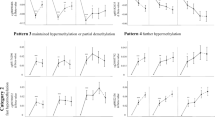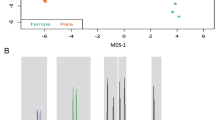Abstract
Objective
To find out whether gDNA methylation can be used as a diagnostic/prognostic method for neonatal sepsis.
Methods
The study was conducted in the neonatal division of a tertiary care referral hospital. Fifty one newborns as cases and thirty seven newborns as controls were enrolled in the study. Using 5-mC DNA ELISA method, the percentage of genomic DNA methylated in these newborns was established.
Results
Highly significant difference in percentage of gDNA methylated was found between the cases and controls (Cases: 2.4 ± 0.39; Controls: 2.07 ± 0.35; P < 0.0001). Culture proven and possible cases were also significantly distinguishable (P < 0.05). No significant differences in methylation were observed in terms of gestational age, birth weight and outcomes such shock, thrombocytopenia, except for renal failure.
Conclusions
The index results showed that genomic DNA methylation varies significantly among newborns with sepsis (clinical, probable and culture positive) and without sepsis. Although the global DNA methylation was not a highly sensitive diagnostic method, this study reveals that DNA methylation might play a vital role in neonatal sepsis susceptibility. Identification of the specific differentially methylated genes might serve as a promising future diagnostic/prognostic marker for neonatal sepsis.


Similar content being viewed by others
References
Tendl KA, Schulz SM, Mechtler TP, Bohn A, Metz T, Greber-Platzer S, et al. DNA methylation pattern of CALCA in preterm neonates with bacterial sepsis as a putative epigenetic biomarker. Epigenetics. 2013;8:1261–7.
Khassawneh M, Hayajneh WA, Kofahi H, Khader Y, Amarin Z, Daoud A. Diagnostic markers for neonatal sepsis: comparing C-reactive protein, interleukin-6 and immunoglobulin M. Scand J Immunol. 2007;65:171–5.
Goeppert B, Konermann C, Schmidt CR, Bogatyrova O, Geiselhart L, Ernst C. Global alterations of DNA methylation in cholangiocarcinoma targets the Wnt signaling pathway. Hepatol. 2013. doi:10.1002/hep.26721.
Guénard F, Bouchard L, Tchernof A, Deshaies Y, Hould FS, Lebel S, et al. DUSP1 gene polymorphisms are associated with obesity-related metabolic complications among severely obese patients and impact on gene methylation and expression. Int J Genom. 2013;2013:1–10.
Scarr E, Craig JM, Cairns MJ, Seo MS, Galati JC, Beveridge NJ, et al. Decreased cortical muscarinic M1 receptors in schizophrenia are associated with changes in gene promoter methylation, mRNA and gene targeting microRNA. Transl Psychiatry. 2013;3:e230.
Wasserkort R, Kalmar A, Valcz G, Spisak S, Krispin M, Toth K, et al. Aberrant septin 9 DNA methylation in colorectal cancer is restricted to a single CpG island. BMC Cancer. 2013;13:398–409.
Philips T. The role of methylation in gene expression. Nat Educ. 2008;1:116–24.
Angrisano T, Pero R, Peluso S, Keller S, Sacchetti S, Bruni CB, et al. LPS-induced IL-8 activation in human intestinal epithelial cells is accompanied by specific histone H3 acetylation and methylation changes. BMC Microbiol. 2010;10:172–80.
McClure EA, North CM, Kaminski NE, Goodman JI. Changes in DNA methylation and gene expression during 2,3,7,8-tetrachlorodibenzo-p-dioxin-induced suppression of the lipopolysaccharide-stimulated IgM response in splenocytes. Toxicol Sci. 2011;120:339–48.
Takahashi K, Sugi Y, Nakano K, Tsuda M, Kurihara K, Hosono A, et al. Epigenetic control of the host gene by commensal bacteria in large intestinal epithelial cells. J Biol Chem. 2011;286:35755–62.
Mathur NB, Agarwal HS, Maria A. Acute renal failure in neonatal sepsis. Indian J Pediatr. 2006;73:499–502.
Acknowledgments
The authors are grateful to the parents of newborns recruited in this study for their kind cooperation.
Contributions
BBD, HAA and VB initiated the idea and designed the work. BBD carried out the laboratory works with the help of BN. BBD, HAA and VB did literature search and framed the manuscript. VB and SCP reviewed the manuscript.
Conflict of Interest
None.
Source of Funding
Intramural Research Grant, Jawaharlal Institute of Postgraduate Medical Education and Research, Pondicherry.
Author information
Authors and Affiliations
Corresponding author
Rights and permissions
About this article
Cite this article
Dhas, B.B., Antony, H.A., Bhat, V. et al. Global DNA Methylation in Neonatal Sepsis. Indian J Pediatr 82, 340–344 (2015). https://doi.org/10.1007/s12098-014-1574-5
Received:
Accepted:
Published:
Issue Date:
DOI: https://doi.org/10.1007/s12098-014-1574-5




